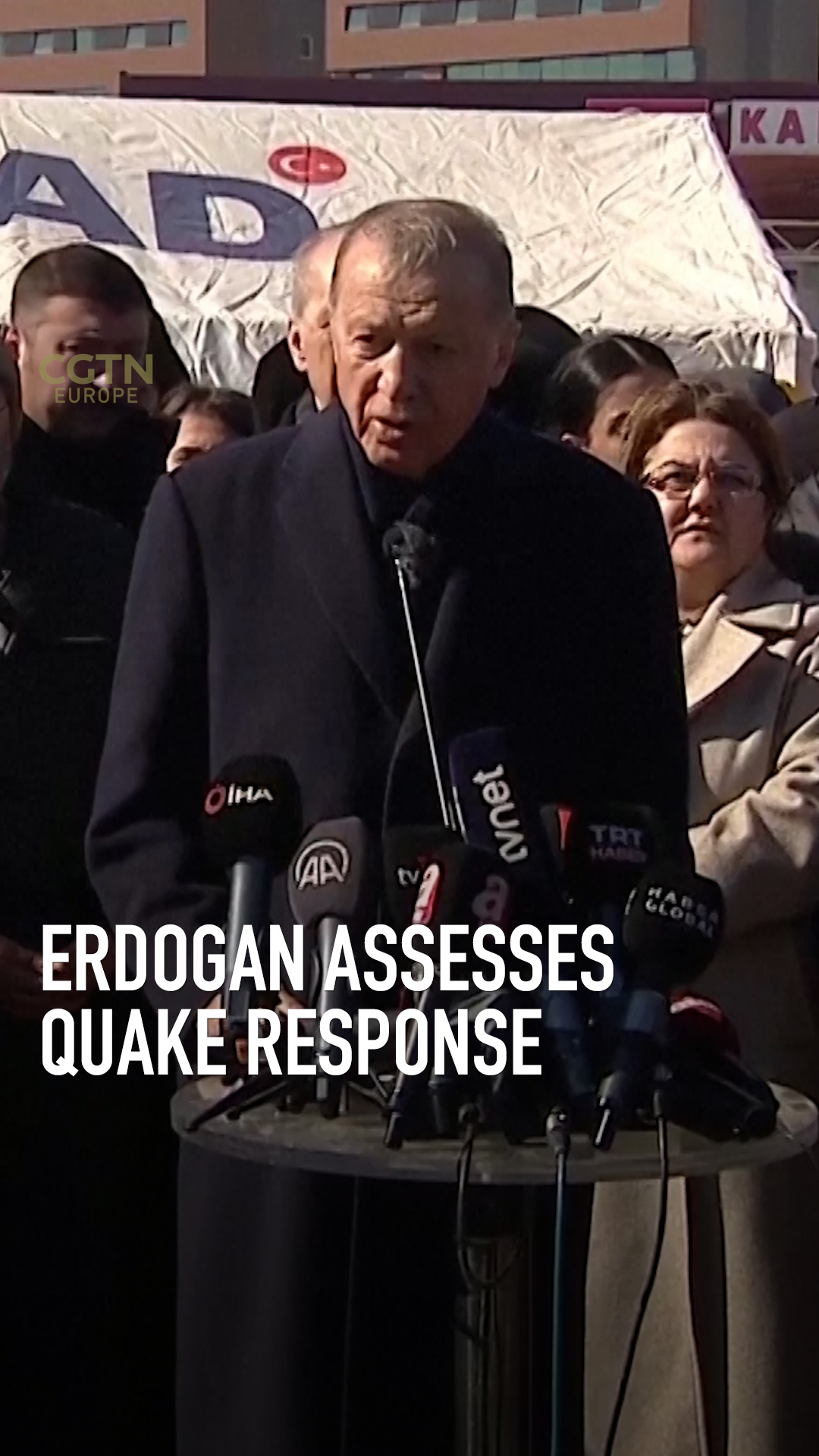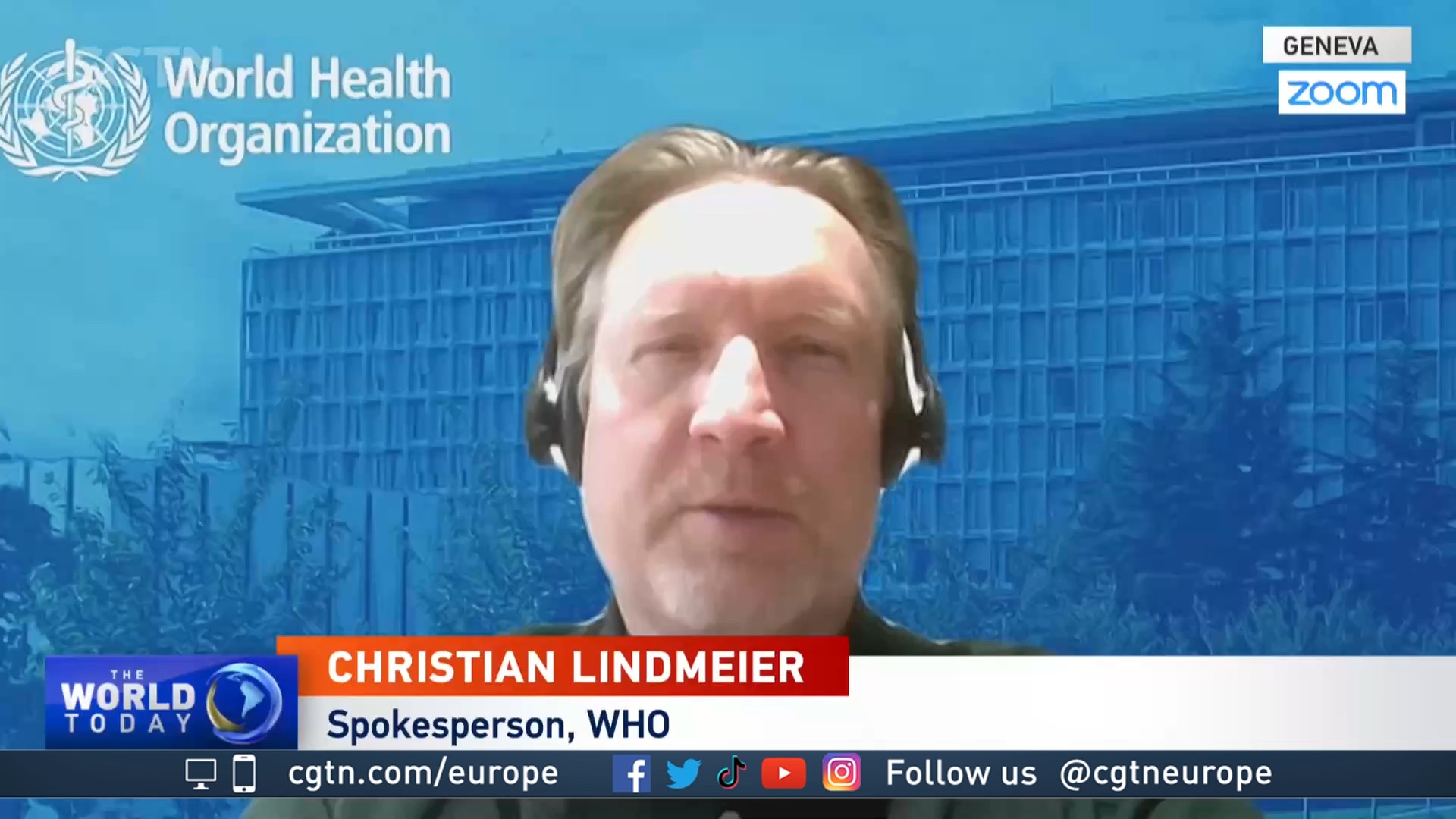01:00

Turkish President Tayyip Erdogan on Wednesday admitted there were problems with his government's initial response to a devastating earthquake in southern Türkiye amid anger from those left destitute and frustrated over the slow arrival of rescue teams.
Erdogan, who contests an election in May, said on a visit to the disaster zone that operations were now working normally and promised no one would be left homeless, as the combined death toll across Türkiye and neighboring Syria climbed above 11,500.
Across a swathe of southern Türkiye, people sought temporary shelter and food in freezing winter weather, and waited in anguish by piles of rubble where family and friends might still lie buried.
READ MORE
Newborn baby, still attached to dead mother, survives quake
German aid workers rush to help earthquake victims
Why have Türkiye's earthquakes proved so deadly?
Rescuers were still digging out some people alive, and finding others dead. But many Turks have complained of a lack of equipment, expertise and support to rescue those trapped - sometimes even as they could hear cries for help.
"Where is the state? Where have they been for two days? We are begging them. Let us do it, we can get them out," Sabiha Alinak said near a snow-covered collapsed building where her young relatives were trapped in the city of Malatya.
There were similar scenes and complaints in neighboring Syria, whose north was also hard hit by Monday's huge quake.
Syria's ambassador to the United Nations admitted the government had a "lack of capabilities and lack of equipment" but blamed this on over a decade of civil war in his country and Western sanctions.

The desperate search continues day and night – here, in Kahramanmaras, Türkiye. /Suhaib Salem/Reuters
The desperate search continues day and night – here, in Kahramanmaras, Türkiye. /Suhaib Salem/Reuters
'An emergency within an emergency'
In an exclusive interview, a World Health Organization (WHO) spokesperson told CGTN that rescue efforts are very different in the two countries.
"We have two very different country set-ups," Christian Lindmeier told CGTN. "Türkiye is badly hit, but Türkiye as a country has a lot of capacity, so here all the health teams that WHO is coordinating are supporting the government in their efforts."
By contrast, however, things are much more difficult in a Syria wracked by civil war.
"All the help which northwestern Syria area has been getting the last years has been mainly coming out from Gaziantep, which is now heavily affected itself," said Lindmeier.
"You have millions of people depending on humanitarian aid [for] years, and they are now struck with a disaster on top of it. So it's an emergency inside an emergency and with a way less prepared country, with way less resources."
03:31

Death toll sure to rise
The death toll from both countries was expected to rise further as hundreds of collapsed buildings in many cities have become tombs for people who had been asleep in their homes when the quake hit in the early morning.
In the Turkish city of Antakya, dozens of bodies, some covered in blankets and sheets and others in body bags, were lined up on the ground outside a hospital.
Melek, 64, said she had seen no rescue teams. "We survived the earthquake, but we will die here due to hunger or cold."
Families in southern Türkiye and in Syria spent a second night in the freezing cold. Many in the disaster zone had slept in their cars or in the streets under blankets, fearful of going back into buildings shaken by the 7.8 magnitude tremor – Türkiye's deadliest since 1999 – and by a second powerful quake hours later.
The reported death toll rose to 9,057 in Türkiye on Wednesday. In war-wrecked Syria, the confirmed toll climbed to more than 2,500 overnight, according to the government and a rescue service operating in the rebel-held northwest.
Turkish authorities released video of rescued survivors, including a young girl in pajamas and an older man covered in dust, an unlit cigarette clamped between his fingers as he was pulled from the debris.
Turkish officials say some 13.5 million people were affected in an area spanning roughly 450 kilometers from Adana in the west to Diyarbakir in the east. In Syria, it killed people as far south as Hama, 250 kilometers from the epicenter.

Relief efforts are being hampered by ruined infrastructure like this section of the D420 road in Demirkopru, Türkiye. /Benoit Tessier/Reuters
Relief efforts are being hampered by ruined infrastructure like this section of the D420 road in Demirkopru, Türkiye. /Benoit Tessier/Reuters
Some of those killed in Türkiye were refugees from Syria's war. Their body bags arrived at the border in taxis, run-down vans and in piles atop flatbed trucks to be taken to final resting places in their homeland.
More than 298,000 people have been made homeless and 180 shelters for the displaced had been opened, Syrian state media reported, apparently referring to areas under government control, not those held by other factions.
In Syria's Aleppo, staff at the Al-Razi hospital attended to a man with bruised eyes who said more than a dozen relatives including his father and mother were killed when the building they were in collapsed.
"We were 16 and 13 of us died. My brother, one-and-a-half-year-old niece and I got out. Thank God," he said. "My father, my mother, my brother, his wife and their four children. The wife and two kids of my brother who got out with me also died."
Election impact
Erdogan, who has declared a state of emergency in 10 provinces and sent in troops to help, arrived in Kahramanmaras to view the damage and see the rescue and relief effort.
Speaking to reporters, with the wail of ambulance sirens in the background, Erdogan said there had been problems with roads and airports but insisted "we are better today. We will be better tomorrow and later. We still have some issues with fuel... but we will overcome those too," he said.
Later, he condemned criticism of the government's response. "This is a time for unity, solidarity. In a period like this, I cannot stomach people conducting negative campaigns for political interest," Erdogan told reporters on his arrival in the southern province of Hatay.
Nevertheless, the disaster will pose a challenge to Erdogan in the May election that was already set to be the toughest fight of his two decades in power.
Any perception that the government is failing to address the disaster properly could hurt his prospects. On the other hand, analysts say, he could rally national support around the crisis response and strengthen his position.
Bodies in blankets
The quake toppled thousands of buildings, including hospitals, schools and apartment blocks, injured tens of thousands and left countless people homeless.
Entire streets in Kahramanmaras, near the epicenter, were reduced to rubble, drone footage showed, with plumes of smoke rising from fires across the town. Hundreds of tents were set up as shelter in a sporting venue. Journalists saw around 50 bodies draped in blankets on the floor of a sports hall.
In Syria, the relief effort is complicated by a conflict that has partitioned the nation and wrecked its infrastructure.
Rescue workers have struggled to reach some of the worst-hit areas, held back by destroyed roads, poor weather and a lack of heavy equipment. Some areas are without fuel and electricity.
Source(s): Reuters